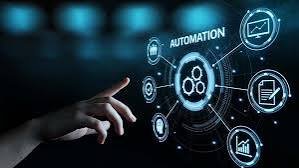Automation is rapidly transforming industries and reshaping the way we live and work. With advancements in artificial intelligence (AI), machine learning, robotics, and the Internet of Things (IoT), the future of automation is poised to unlock unprecedented levels of efficiency, productivity, and innovation. But what will this future look like, and how will it impact our world? Let’s explore.
- The Rise of Smart Manufacturing
One of the most significant areas where automation will thrive is manufacturing. Factories of the future, often referred to as "smart factories," will integrate AI, robotics, and IoT to streamline production processes. Machines will be able to self-diagnose and predict maintenance needs, minimizing downtime. Human intervention will be focused on monitoring, design, and problem-solving, allowing production lines to run continuously with minimal errors.
The integration of cobots (collaborative robots) that work alongside human employees will further increase efficiency while maintaining the need for skilled human workers.
- Autonomous Transportation
Autonomous vehicles are no longer the stuff of science fiction. Self-driving cars, trucks, and drones are already being tested and will soon be part of our daily lives. Automation in transportation will reduce human error, enhance safety, and increase efficiency in logistics and personal mobility.
Self-driving trucks will revolutionize freight transport, significantly lowering costs and speeding up delivery times. On the other hand, drones could become a vital part of last-mile delivery services for online shopping or even for medical supplies in hard-to-reach areas.
- AI-Powered Customer Service
Customer service is another field where automation is rapidly advancing. AI-driven chatbots and virtual assistants are already handling many routine customer inquiries. In the future, these systems will become even more sophisticated, capable of understanding human emotions and providing personalized responses.
The result? Faster resolutions to issues, 24/7 availability, and reduced strain on human customer service agents, who can then focus on more complex, high-value tasks.
- Healthcare Automation
In the healthcare sector, automation is set to revolutionize patient care and administrative processes. AI-driven systems will help doctors diagnose diseases more accurately, automate administrative tasks like scheduling, and assist in personalized treatment plans based on patient data.
Surgical robots, already in use today, will become even more precise, helping to perform minimally invasive surgeries with higher accuracy. Automation will also improve the drug development process, allowing for quicker and more effective solutions to diseases.
- Job Market and the Need for New Skills
While automation will boost efficiency and reduce costs, it will also disrupt the job market. Repetitive, manual jobs will be increasingly automated, potentially leading to job displacement in certain sectors. However, this shift will create demand for new skills, particularly in areas like AI development, robotics, cybersecurity, and data science.
The future workforce will need to adapt by learning to work alongside machines, focusing on creativity, problem-solving, and emotional intelligence—skills that are harder to automate.
- Environmental Impact
Automation can also play a role in combating climate change. Smart grids, automated energy management systems, and AI-driven solutions for optimizing resource use will help industries become more sustainable. Automation will aid in reducing waste, improving energy efficiency, and creating a greener future for everyone.
Conclusion: A Double-Edged Sword?
The future of automation presents both challenges and opportunities. While automation will lead to significant advancements in productivity, cost savings, and innovation, it will also require society to rethink education, workforce development, and ethical considerations. As automation becomes more widespread, collaboration between industries, governments, and educational institutions will be essential in ensuring that its benefits are maximized while mitigating its challenges.
Embracing automation is not just about adopting new technologies; it’s about preparing for a future where machines and humans collaborate to create a more efficient, connected, and sustainable world.
